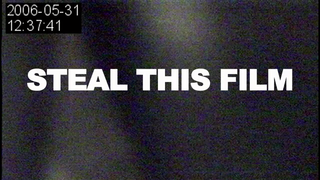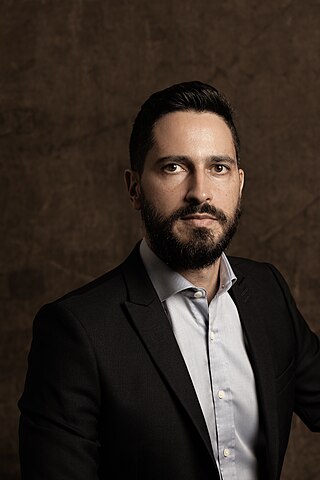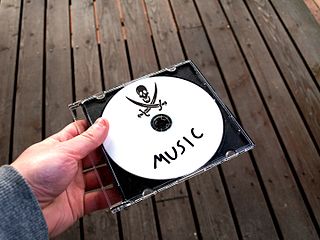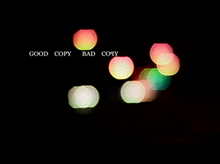
Criticism of copyright, or anti-copyright sentiment, is a dissenting view of the current state of copyright law or copyright as a concept. Critics often discuss philosophical, economical, or social rationales of such laws and the laws' implementations, the benefits of which they claim do not justify the policy's costs to society. They advocate for changing the current system, though different groups have different ideas of what that change should be. Some call for remission of the policies to a previous state—copyright once covered few categories of things and had shorter term limits—or they may seek to expand concepts like fair use that allow permissionless copying. Others seek the abolition of copyright itself.
In computer networks, download means to receive data from a remote system, typically a server such as a web server, an FTP server, an email server, or other similar systems. This contrasts with uploading, where data is sent to a remote server.

Free Culture: How Big Media Uses Technology and the Law to Lock Down Culture and Control Creativity is a 2004 book by law professor Lawrence Lessig that was released on the Internet under the Creative Commons Attribution/Non-commercial license on March 25, 2004.
Piratbyrån was a Swedish think tank established to support the free sharing of information, culture, and intellectual property. Piratbyrån provided a counterpoint to lobby groups such as the Swedish Anti-Piracy Bureau.

The Pirate Bay, commonly abbreviated as TPB, is a freely searchable online index of movies, music, video games, pornography and software. Founded in 2003 by Swedish think tank Piratbyrån, The Pirate Bay facilitates the connection among users of the peer-to-peer torrent protocol, which are able to contribute to the site through the addition of magnet links. The Pirate Bay has consistently ranked as one of the most visited torrent websites in the world.

Hans Fredrik Lennart Neij, alias TiAMO, is the co-founder of The Pirate Bay, and the Swedish Internet service provider and web hosting company PRQ. Neij was one of the defendants in The Pirate Bay Trial which began on 16 February 2009. He and other operators of The Pirate Bay were charged with assisting users in copyright infringing practices. His time during the aforementioned trial has been captured in the documentary film TPB AFK by Simon Klose.

Per Gottfrid Svartholm Warg, alias anakata, is a Swedish computer specialist, known as the former co-owner of the web hosting company PRQ and co-founder of the BitTorrent site The Pirate Bay together with Fredrik Neij and Peter Sunde.

PRQ is a Swedish Internet service provider and web hosting company created in 2004.

Steal This Film is a film series documenting the movement against intellectual property directed by Jamie King, produced by The League of Noble Peers and released via the BitTorrent peer-to-peer protocol.

Tecno brega or technobrega (technotacky) is a form of music from northern Brazil, particularly Belém, Pará. Music of the genre is created primarily through remixing and reworking songs from popular music and music from the eighties. While there is a large amount of famous music used in tecno brega, the majority of it is original material (80%). Several DJs and music producers from the tecno brega movement were featured in the peer-to-peer filesharing documentary Good Copy Bad Copy.

Peter Sunde Kolmisoppi, alias brokep, is a Swedish entrepreneur and politician. He is best known for being a co-founder and ex-spokesperson of The Pirate Bay, an illegal BitTorrent search engine. He is an equality advocate and has expressed concerns over issues of centralization of power to the European Union in his blog. Sunde also participates in the Pirate Party of Finland and describes himself as a socialist. In April 2017, Sunde founded Njalla, a privacy oriented domain name registrar, hosting provider and VPN provider.

Ronaldo Lemos is a Brazilian academic, lawyer and commentator on intellectual property, technology, and culture.
Pirate Cinema is a do-it-yourself cinema. Recently Pirate Cinema has been associated with groups in Brazil, Berlin, Copenhagen, Melbourne and Helsinki, where local Pirate Cinema groups are associated with the anti-copyright movement and squatting.

The Pirate Bay raid took place on 31 May 2006 in Stockholm, when The Pirate Bay, a Swedish website that indexes torrent files, was raided by Swedish police, causing it to go offline for three days. Upon reopening, the site's number of visitors more than doubled, the increased popularity attributed to greater exposure through the media coverage, which is an example of the Streisand effect.

The Pirate Bay trial was a joint criminal and civil prosecution in Sweden of four individuals charged for promoting the copyright infringement of others with the torrent tracking website The Pirate Bay. The criminal charges were supported by a consortium of intellectual rights holders led by the International Federation of the Phonographic Industry (IFPI), who filed individual civil compensation claims against the owners of The Pirate Bay.

RiP!: A Remix Manifesto is a 2008 open-source documentary film about "the changing concept of copyright" directed by Brett Gaylor.

TPB AFK: The Pirate Bay Away From Keyboard is a 2013 Swedish documentary film directed and produced by Simon Klose. It focuses on the lives of the three founders of The Pirate Bay – Peter Sunde, Fredrik Neij, and Gottfrid Svartholm – and the Pirate Bay trial. Filming began sometime in 2008, and concluded on 28 February 2012.

Music piracy is the copying and distributing of recordings of a piece of music for which the rights owners did not give consent. In the contemporary legal environment, it is a form of copyright infringement, which may be either a civil wrong or a crime depending on jurisdiction. The late 20th and early 21st centuries saw much controversy over the ethics of redistributing media content, how much production and distribution companies in the media were losing, and the very scope of what ought to be considered piracy – and cases involving the piracy of music were among the most frequently discussed in the debate.
Participants in an online music scene who rearrange spliced parts of musical pieces form mashup culture. The audio-files are normally in MP3 format and spliced with audio-editing software online. The new, edited song is called mashup. The expression mashup culture is also strongly connected to mashup in music. Even though it was not originally a political community, the production of mash-up music is related to the issue of copyright. Mashup Culture is even regarded as "a response to larger technological, institutional, and social contexts".
The Playlist is a docu-drama miniseries created for Netflix. It was inspired by the book Spotify Untold written by Sven Carlsson and Jonas Leijonhufvud. Directed by Per-Olav Sørensen, the series tells a "fictionalized" story of the birth of the Swedish music streaming company Spotify, along with its early challenges.















